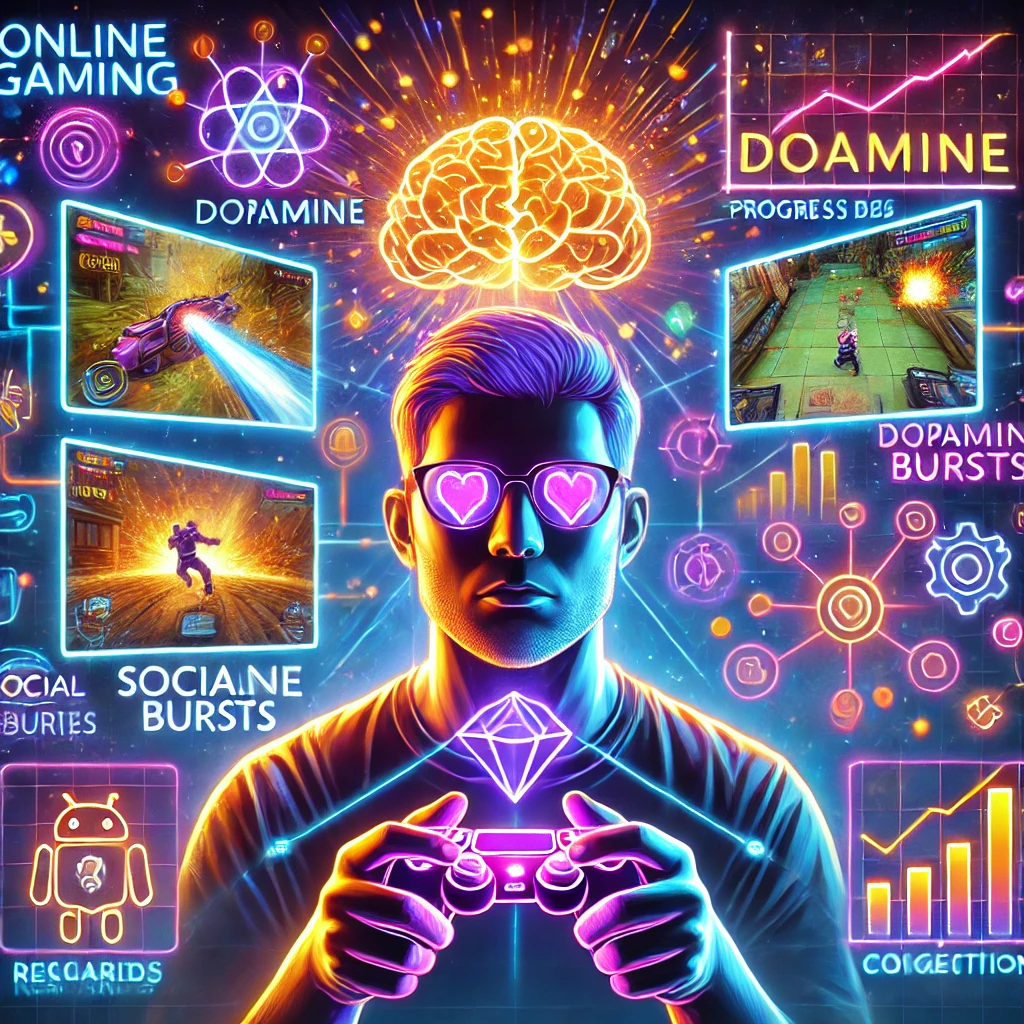Online gaming has transformed from a niche hobby to a global craze, engaging billions of players around the world. From multiplayer battle royales to immersive MMORPGs, these games hold our attention like few other types of entertainment. What makes these games so compelling, often drawing players back for hours? The explanation lies in the psychology behind online gaming.
This article delves into the psychological aspects that fuel our passion for online gaming, the factors that drive us to return, and the effects this form of entertainment has on our mental health.
1. The Appeal of Online Gaming
a. Escapism
A primary reason for engaging in online games is the desire to escape the stresses of everyday life. Gaming offers a temporary retreat, immersing players in virtual worlds where they can forget their worries and adopt new personas.
Example: In open-world games like World of Warcraft, players can create avatars representing idealized versions of themselves, offering a sense of freedom and adventure.
b. Sense of Achievement
Online games often feature challenges, rewards, and progression systems that evoke a sense of accomplishment. Advancing levels, acquiring rare items, or completing quests serve as tangible markers of success.
Example: Completing a tough raid in Destiny 2 or reaching a high rank in League of Legends brings a feeling of mastery.
c. Social Connection
The social aspect of multiplayer games is a significant attraction. Players can make friends, join guilds, or compete against others, fostering a sense of community and camaraderie.
Example: Games like Fortnite and Among Us promote teamwork and communication, making them popular social activities.
d. Instant Gratification
Online games are designed to provide immediate feedback and rewards, appealing to our brain’s desire for instant gratification. This keeps players engaged and encourages continued play.
2. Psychological Elements That Keep Players Hooked
a. The Dopamine Effect
Gaming activates the brain’s reward system by releasing dopamine, a neurotransmitter linked to pleasure and motivation. Achieving in-game goals, unlocking rewards, or winning matches triggers dopamine surges, reinforcing the urge to play.
Cycle: Challenge → Reward → Satisfaction → Repeat
b. The Flow State
Psychologist Mihaly Csikszentmihalyi introduced the concept of “flow,” a state of complete immersion and focus. Games balance challenge and skill, creating conditions where players lose track of time and stay fully engaged.
Example: A tense battle in Call of Duty: Warzone where players are intensely focused on strategy and execution exemplifies the flow state.
c. Variable Rewards
Many online games use a reward system with unpredictable outcomes, similar to gambling. Loot boxes, rare item drops, and randomized rewards keep players invested, as the anticipation of a reward can be as thrilling as the reward itself.
Example: Opening packs in FIFA Ultimate Team or rolling for characters in Genshin Impact taps into this psychological principle.
d. Social Validation
Achievements in online games often come with peer recognition. Leaderboards, rare skins, or exclusive emotes act as status symbols, reinforcing a player’s sense of accomplishment and social standing.
Example: Displaying a rare skin in Fortnite can signal expertise or dedication, enhancing social validation.
3. The Impact of Online Gaming on Mental Health
Positive Effects
Stress Relief: Gaming can provide a break from stress, offering relaxation and a sense of control.
Cognitive Benefits: Strategic games improve problem-solving skills, hand-eye coordination, and reaction times.
Social Support: For many, gaming communities offer meaningful connections and emotional support. Negative Effects
Addiction Risks: The engaging nature of games can lead to excessive playing, which can disrupt everyday activities.
Social Isolation: Relying heavily on online gaming for social interactions may diminish real-world social engagement.
Frustration and Toxicity: Competitive gaming can induce stress and expose players to harmful behaviors, such as harassment.
Why We Keep Coming Back
Personal Investment
Players dedicate time, money, and effort to online games, creating a psychological need to keep playing. The sunk cost fallacy, where people continue something due to previous investments, can also influence this behavior.
Example: A player with extensive hours in Minecraft might feel the need to continue building and exploring.
Fear of Missing Out (FOMO)
Games often offer limited-time events, rewards, or content, pushing players to log in regularly. Missing these opportunities can cause anxiety and lead to habitual gaming.
Example: Seasonal battle passes in games like Fortnite or Apex Legends leverage FOMO.
Competitive Drive
The urge to improve, win, and surpass others fuels the competitive side of online gaming. Climbing ranks or achieving high leaderboard positions keeps players driven.
Example: Valorant players strive to enhance their ranks, aiming for both personal and team success.
Endless Updates
Frequent updates, new content, and evolving storylines keep games interesting. Players remain eager to experience the latest additions.
Example: Games like World of Warcraft and GTA Online continually expand their universes with new content.
How Developers Design for Engagement
Game creators use various strategies to keep players hooked:
- Progression Systems: Experience points, achievements, and unlockable rewards provide a sense of growth.
- Social Features: Chat systems, guilds, and cooperative modes enhance community interaction.
- Event-Based Content: Timed events encourage regular participation.
- Personalization: Customizable characters and environments offer a unique experience for each player.
Striking a Healthy Balance
While online gaming can be very rewarding, it’s important to maintain a balance:
- Set Time Limits: Designate specific hours for gaming to prevent overindulgence.
- Take Breaks: Regularly step away from the screen to rest your eyes and mind.
- Prioritize Real-Life Connections: Balance online gaming with face-to-face relationships.
- Reflect on Your Motivation: Play for fun, not out of obligation or FOMO.
Conclusion
Online gaming captures our attention because it meets basic psychological needs: connection, achievement, and escapism. While the industry’s design techniques are powerful tools for engagement, understanding the psychology behind gaming allows us to enjoy its benefits while avoiding potential drawbacks. By playing mindfully, we can appreciate the best aspects of online gaming while maintaining our mental and emotional health.
